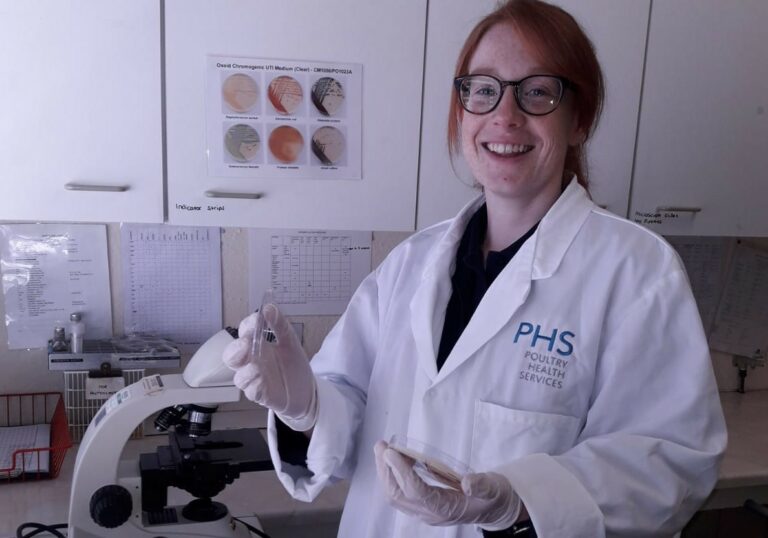By Alex Royden BVSc MSc MRes PhD MRCVS, Poultry Health Services
For the agricultural community, the current Covid-19 outbreak has not resulted in too many changes to our daily routine. Whilst much of the British public is in lockdown, as key workers, the British farming sector must ‘Keep Calm and Carry On’ (whilst observing social distancing, of course!). However, with it now looking likely that the lockdown will be extended, and perhaps a little more time stuck indoors, what can vets do to help you make the most of this time?
In line with advice from the UK Government, the Royal College of Veterinary Surgeons (RCVS) and the British Veterinary Association (BVA), vets are not performing routine physical veterinary work. However, we are still dealing with emergencies and offering post-mortems and laboratory services. Poultry vets are available 24/7 for veterinary advice, normally at no extra cost to the producer.
Visiting Veterinary Practices
At the current time, planning is key. We strongly recommend contacting your local practice if you have a problem on site or you need to order any medicines, supplements or vaccines. Vets are always happy to advise and may recommend a visit or a post-mortem to investigate any issues further. Practices have protocols in place to ensure that birds can be dropped off for post-mortem and any products can be picked up contact-free, reducing the risk to both you and our staff.
Emergency and Essential Farm Visits
Some visits are essential and after discussing the problem with a vet, they may decide that a site visit is necessary. The RCVS are urging vigilance to reduce the spread of Covid-19 and have advised that animals should only be seen in emergencies or where urgent assessment and/or treatment is needed to prevent an emergency.
Whilst on site, vets will observe all of the strict biosecurity measures they usually do and personal protective equipment, such as overalls, masks and gloves, will be worn at all times. In addition, farmers and vets should observe government advice on social distancing and keep a minimum of 2m apart at all times.
If you are self-isolating or at risk, please call your local branch and let them know. We will then take appropriate steps with yourself to ensure all parties are as safe as possible whilst we deal with any issues you have with your flock.
Remote Routine Visits for Health and Welfare Plans
Red Tractor and Lion Code have suspended their physical audits indefinitely. However, it is still important to have your Veterinary Health Plan in place and up to date for any upcoming audits. Whilst a physical veterinary visit is not recommended at this time, vets are able to update your health plan via telephone or teleconferencing software. Like a physical health plan visit, we can discuss your site and any issues you may be having, target problem areas and design a bespoke plan to improve performance.
Data Analysis and Flock Reviews
Veterinary online clinical recording databases, such as Poultry Health Services’ ‘Digiflock’ database, allow vets access to all of your records in one place. These databases allow vets to analyse trends in disease, antibiotic usage and other key parameters. Vets can delve deeper into problems and implement strategies to prevent recurrence and improve performance. Some databases also give you access to your records; this is particularly useful when getting ready for an audit, as you can show the auditor your records on a computer instead of printing out reams of paper!
Improve Your Knowledge with Online Courses
With Government advice being “Stay Home, Save Lives”, now is the ideal time to do online training courses. Our online courses last approximately 3 hours and don’t need to completed in one sitting. At the end of each course, there is a short questionnaire. Then, once complete, you can print your own training certificate, which is valid for five years.
Salmonella and Other Laboratory Testing
Salmonella samples are still required under the National Control Programme (NCP) and assurance scheme requirements.
Please ensure that you have sufficient consumables on farm and consider sampling early (but be mindful of how long the test is valid for). There are currently delays with samples arriving via Royal Mail, so we advise that any urgent samples are sent by Royal Mail Special Delivery Guaranteed by 9am® service. If practical, consider hand delivering samples and keep in touch with the laboratory to ensure delivery.
Finally, we know that this might be a worrying time for you and your business. However, we are working hard to ensure that we can continue offering producers options tailored to their business so that you can continue operating as normally as possible, in a safe environment. From online training courses to routine conference calls with your vet, there are many ways that will allow you to make the most of this time and perhaps find new ways of dealing with problems. We are all in this together.


